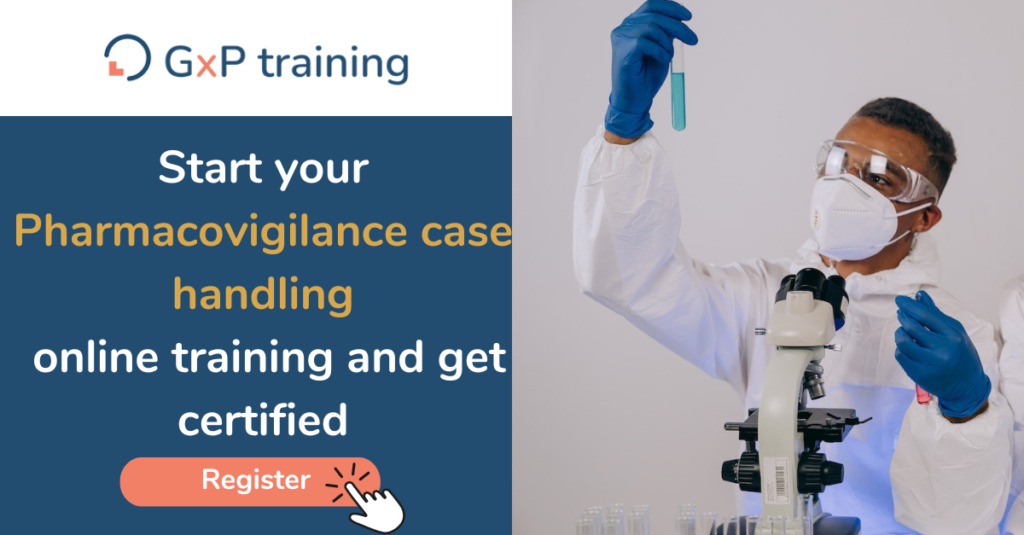Pharmacovigilance case handling training helps you with clinical trials, documentation, data analysis, and the safe handling of drugs.
Consider any industry, and specific personnel will take care of safety inspections and case-by-case handling for each product release. The same goes for the pharma industry, and the process is called pharmacovigilance. You can understand the term ‘Pharma,’ which means drug, and ‘vigilance’ which is to keep watch. Pharmacovigilance is essential to ensuring the safety criticality of every drug put on the market. It is also a complex process requiring extensive case-by-case investigation and consists of various operations and activities such as drug coding, casualty, assessments, quality control, reporting, and more.
The ultimate goals of pharmacovigilance are to ensure the safe use of drugs, assess the risks and benefits, and educate the patients and everyone concerned. And it is the duty of everyone involved in the pharma industry, from the clinical trials to the production of the drugs, to ensure that these goals are met.
Why should you get Pharmacovigilance Case Handling Training
Understanding the case management and training for the pharmacovigilance case handling process can help you better understand:
- The various phases of a clinical trial
- The various documentation involved
- How to maintain quality and avoid errors
- How to report the case findings in the proper format and so on
All these activities are critical to successfully approving a pharma product in any region of the world.
The pharmacovigilance case handling training will include in-depth details, guidance on all the above activities, and efficient overall case management.
As PV is critical for any drug to be approved by the health boards and for continued usage, medical practitioners and drug manufacturers should be well-versed in PV case handling.
What constitutes PV case handling training?

Phases of clinical trial
A clinical phase consists of five phases that must be tracked for compliance and have proper reporting mechanisms in place to detect and report any anomaly or suspected behavior of drug usage. PV case handling helps systemize this process and allows for efficient case handling that aligns well with the regulatory statutes and laws.
Training for PV case handling will include a detailed discussion on the scope of PV, the steps involved in the entire process, and all the guidelines that must be followed in each process step.
Monitoring investigational drugs
A lot of time and effort goes into a clinical trial with multiple researchers noting down all their findings, and most often, it is an ongoing process. While individual researchers may follow the procedure and record all the findings, tracking every possible side effect the drug may produce becomes difficult. That’s why a detailed PV case handling is required, as it could help compile all the data and monitor the effects of the drug even after it is introduced in the market.
PV lays down the important principles for monitoring drug usage and establishes proactive processes that can help detect and avoid medical disasters.
Training for PV enables them to set up the proper monitoring protocols and catch any medical anomalies caused by drugs before they can cause high-scale damage.
Data collection: Receipt and validation of a case report
For a drug to be approved for marketing and sale, several relevant authorities, such as the Marketing Authorization Holders (MAHs), will need to verify the validity of the medical reports of the drug in question. The data for this type of validation will be gathered from both solicited and unsolicited reports.
Solicited reports are gathered from the data generated during clinical trials, professional surveys, patient surveys, disease management programs, patient support management programs, registries, and other formal means of data collection.
Unsolicited reports are usually gathered from unorganized data collection systems such as spontaneous reports, literature reports, and reports from non-medical sources.
PV case handling training lets you receive data from multiple sources, such as solicited and unsolicited, as efficiently and accurately as possible. The training will help you understand the various relevant filters to apply, the common channels of data reception, and the best way to work on the received data.
You also get trained on the various criteria for validating these data before submitting them to the relevant authorities. The four minimum criteria to meet the validity of an ICSR are:
- At least one or more identifiable reporter
- At least one identifiable patient
- One or more suspected ADR
- One or more suspected falsified medicinal product
The training also includes the follow-up procedures that must be done to fill in any information gaps found in the received reports.
Data collection for special situations
PV case handling needs to be very detailed. Attention must be paid to special situations like drug effects during pregnancy or breastfeeding, how it reacts with other drug combinations, etc. PV case handling training helps you understand this process well and educates you about the various special considerations you must take while collecting and assessing the data.
Triage, data entry, and assessment
Triaging is prioritizing the received reports and sorting down all the received data based on the relevant criteria such as date, seriousness, impact level, and so on.
The data entry part of PV case handling should also consider duplicate data and identify and delete the duplicates.
A complete data entry consists of the case operator recording all the needed information in a proper safety report format. The training will help you understand the details that must be included in the report, including the reporter’s details, patient details, medical product details, description of side effects, and every other necessary information.
This process also involves a bit of coding expertise as the information, such as adverse effects, must be coded in universally accepted and recognizable codes.
Get enrolled today
Besides providing a detailed breakdown of every step involved in the PV case-handling process, the training course also includes valuable information on maintaining quality and avoiding case-handling errors. It helps you understand the entire process, lets you execute the right steps, and submit the safety reports to the relevant authorities without making any errors in the formalities. This online pharmacovigilance case handling training has been developed by Ellena J. Jefferson, a Training and Quality Advisor with ICON plc. This 2-hour training course provides you with a certificate of completion and CEU/CPD accreditation.





